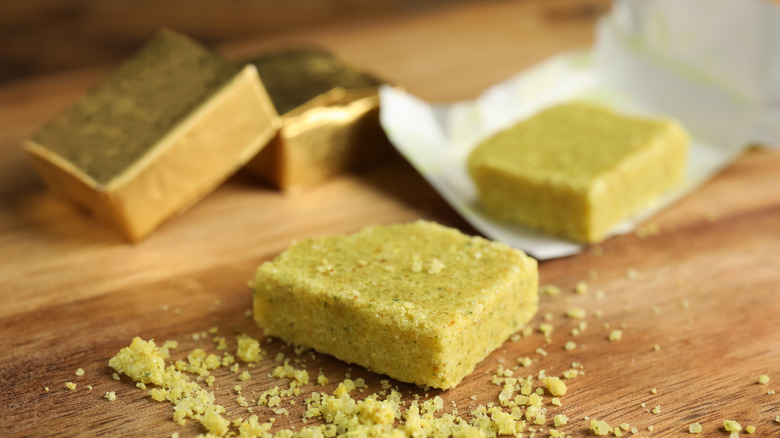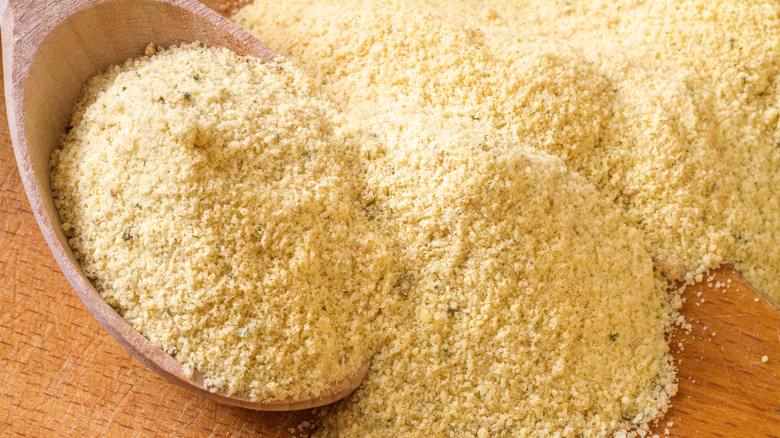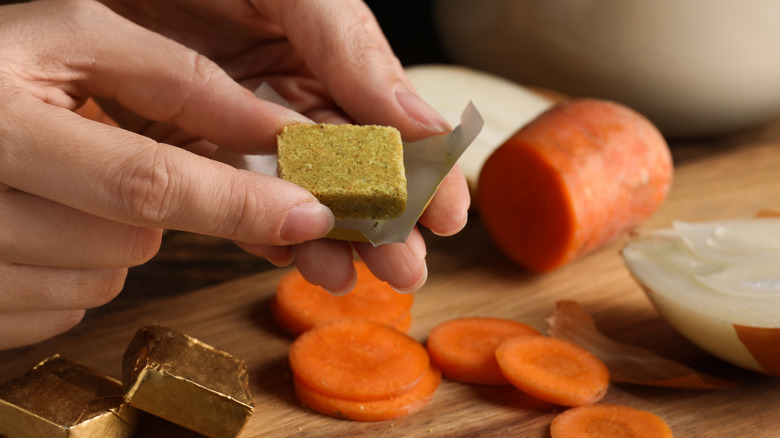Chicken Powder Vs Bouillon: What's The Difference?
We may receive a commission on purchases made from links.
Walking through the soup aisle, you're bound to find a section dedicated to chicken bouillon, or stock cubes as they're sometimes called. If you're a home cook who loves making soups and stews, you've probably used them plenty of times. Each foil-wrapped parcel may be small, but just one can turn a bland-tasting soup into a flavor fest with its savory richness. But while checking out the bouillon options, you might also find chicken powder (sometimes called chicken bouillon powder) sitting right there on the shelf. Don't let the names fool you, they aren't quite the same thing.
The main distinction comes down to flavor profile. Think of chicken bouillon like a complete seasoning package — it delivers that classic chicken taste along with a blend of herbs and spices to help you bulk up the flavor of whatever cooking you have going on. Chicken powder, however, takes a different approach by offering a pure, concentrated chicken flavor with strong umami notes, making it perfect for dishes where you want a straightforward savory chicken essence that's free from any distracting seasoning. The reason for this difference ultimately comes down to how the two of them are made.
The making of chicken bouillon and chicken powder
Both bouillon and powder get their start from a common ingredient, which is good old-fashioned chicken stock. The process starts the same way you might make stock at home, just on an industrial scale. Fresh, bone-in chicken pieces are slowly simmered in water for at least four hours, allowing the rich flavors from the meat and bones to infuse the liquid.
How this broth is made, however, differs depending on what is being made. For chicken powder, the broth is simply made from chicken and perhaps a touch of salt or MSG to give a pure, concentrated chicken flavor. But bouillon cubes take a different approach. The stock is further enriched with other ingredients like onions, celery, and herbs during the simmering process. These added aromatics are what ultimately give bouillon cubes their distinctive, complex flavor profile that home cooks have come to love. After simmering, the broth is dehydrated into a paste and is either ground into the fine, sprinkleable powder or pressed into those familiar little cubes.
Putting chicken bouillon and powder to use
If you want to make the most of these chickeny flavor bombs, we have plenty of ideas. While they both add chicken flavor to your cooking, they shine in different dishes. Chicken powder, with its pure, intense flavor, is your best friend in Chinese cuisine. Try adding a teaspoon to your next batch of Chinese-style fried rice or noodles and the umami kick will make sure you're never going to make these dishes without it again. That's not all you can do with chicken powder. Did you know you can make an ultra-flavorful batch of popcorn with a bit of chicken powder?
Bouillon cubes really shine when you're looking to build rich, complex flavors, which is why their number one use is for making soup or stew bases. Feel free to get creative, however — try crushing a cube into pizza dough for a subtle meaty flavor, or throw it together with your homemade meatballs for a serious flavor boost. Another great option is to add a cube to the pasta water when making mac and cheese. Just watch out for the sodium content, as the flavor is intense and often salty, so you don't want to add too much to any dishes.
Considering how useful (and cheap) they are, stock both in your kitchen if you can. If you can't find chicken powder, this Lee Kum Kee brand is available at a reasonable price online. They're shelf-stable, so they can stay there for months, ready for whenever you're in the mood for anything from a quick Asian stir-fry to a simmering pot of creamy leek and potato soup.


